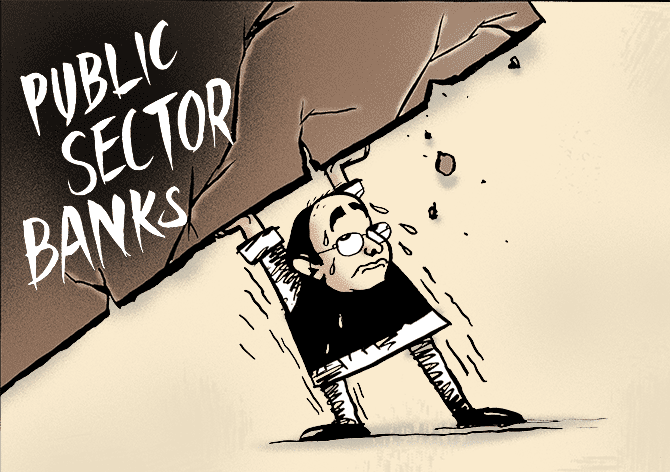'We aren't so unreasonable as to demand that he should have fully reversed Indira Gandhi's worst economic legacy, bank nationalisation.'
'But he could have made a beginning by selling off the two most stressed small public sector banks, and then announced that each year for the next 10, one government bank with the most messed-up balance sheet will be sold.'
'It would have electrified the markets, shocked his other banks into better behaviour, and marked his name among the great reformers,' argues Shekhar Gupta.

Illustration: Dominic Xavier/Rediff.com
In Joseph Heller's Catch-22, Lieutenant Milo Minderbinder earned his fame trading with himself in a way that everybody involved in the circular transaction made a profit, which, ultimately, came out of the government's pocket.
The reason he became an enduring brand ambassador of cynical capitalism is precisely because nothing mattered to him except profit for his company (called the Syndicate).
He always made a profit, usually buying up the entire supplies of some commodity: Eggs, tomatoes in a village, selling at a monopoly price to his own unit.
But once he slipped up when he bought the entire stock of Egyptian cotton in the world.
There were no buyers left, as even if somebody bought it from him, he sold it back to him.
In creative desperation, he even soaked balls of cotton in chocolate and tried selling them to his fellow soldiers' mess.
He had killed the Egyptian cotton market by becoming a monopoly trader -- with himself.
But the genius figured out a way: Why not sell it to his government?
Of course, as a pucca capitalist he believed the government had no business to be in business.
But the sarcastic words of former laissez faire American President Calvin Coolidge (one with a hundred quotable quotes) came in handy: It's the business of the government to be in 'business'!
Coolidge was, after all, a president, and what he said must be right, said Milo, the government's business is to be in business.
So why not sell the cotton to the United States government instead?
Now replace Milo Minderbinder with Bharat Sarkar, post-1969, and Egyptian cotton with India's banks. See that economics plays out now.
Indira Gandhi first nationalises all of India's major banks and creates a State monopoly in banking and finance, particularly as it also owns all insurance companies and developmental financial institutions (former IDBI, IFCI, etc).
Then it starts buying from itself: Getting banks to invest in its own bonds, lend for its own projects and public sector enterprises, its loan melas and then, ultimately, loan-waivers.
So effectively its banking monopoly also became its unbeatable vote-buying business.
In the process, the banks kept going bankrupt at regular intervals.
Now, since the banks were all State-owned, they couldn't be allowed to fail, and the government is too big to fail and it has the powers to tax and print money. So the government again buys its own banks (recapitalisation).
And if it has to be done through an off-budget method so as not to make the fisc look bad, you can have your banks issue bonds.
And that, in turn, you can get your other companies -- public sector undertakings holding spare cash -- to buy.
Now tell me, isn't our government an even sharper capitalist than Milo Minderbinder? It's even better, in fact.
If his economics was Catch-22, Bharat Sarkar's is one better, Catch-23.
If you are the googling type, you might be tempted to ask how all this Catch-23 sarcasm squares with my appreciation of the latest bank bailout plan.
It is a good plan because it is the only thing possible under the circumstances.
If your patient is asphyxiating in an extreme asthma attack, and you are the doctor, what do you do but pump the body with steroids, never mind the side-effects?
So, in a situation in which 70 per cent of the banking is State-owned, is near-bankrupt (bad loans generally exceeding their capital), and a collapse looms, what do you do?
Let one domino collapse and pick up the debris?
In a situation in which something had to be done, this bailout is decisive, bold and, if I may add in fairness, a little bit creative.
The idea of issuing bonds to raise the bulk of the funds is smart. But now the suggestion that other cash-rich PSUs, obviously mostly energy monopolies, would be 'nudged' to buy these, is disturbing.
There were bolder, more decisive, and reformist options.
Great leaders never waste a crisis, but Narendra Modi blew one here.
We aren't so unreasonable as to demand that he should have fully reversed Indira Gandhi's worst economic legacy, bank nationalisation. Toxic economic ideas have a very long half-life.
But he could have made a beginning by selling off just the two most stressed small public sector banks, and then announced that each year for the next 10, one government bank with the most messed-up balance sheet will be sold.
It would have electrified the markets, shocked his other banks into better behaviour, constrained the political class from writing more tax-payer cheques to buy votes, and marked his name among the great reformers.
But is that really what Modi wants -- to be remembered as an economic reformer?
Commitment to PSUs, or of the government being in business, may not be the only touch-stone of a reformer, but it is an important one.
No Indian leader -- not even Manmohan Singh, P V Narasimha Rao, and P Chidambaram -- has dared to sell off PSUs, especially profit-making ones. The only one to have that instinctive commitment was Atal Bihari Vajpayee.
He was thwarted by a Supreme Court order rooted in the 1970s political economy -- it barred any divestment without parliamentary sanction and prevented the sale of two oil giants, Hindustan Petroleum Corporation and Bharat Petroleum Corporation.
We would have expected Modi to pick up the thread from his own party's idol. What's he doing instead?
He is selling Hindustan Petroleum Corporation, but to his own Oil and Natural Gas Corporation -- once again Milo trading with Milo, with the State's money. Catch-23.
Modi's supporters have a point that unlike the period 1991 onwards, when much reform could be carried out by stealth, today everything is in the public eye and has political consequences.
But who is better equipped than Modi to mould public opinion?
The questions, therefore, are: Why is he not doing so? Does he even want to do so? And if not, what exactly does he want?
The answers lie in his politics.
Unlike Vajpayee, he is a committed swayamsevak, and unlike him again, instead of dismissively laughing at the juvenility of the old Rashtriya Swayamsevak Sangh socio-economics, he is a true believer in ideology.
Caught between his ingrained devotion to the idea of being a swayamsevak in the image of a Mohan Bhagwat and be remembered as a modernising reformer like Vajpayee, he ends up as another Indira Gandhi, another great Statist -- a great economic-nationalist running an expanding and increasingly control-freak government.
I would hazard to read his politico-economic mind as: There's nothing wrong with the State running the economy as long as you run the State wisely, and honestly.
The quest for the perfect State has never succeeded. It is unlikely to now.
Modi has spent his youth and middle age as a full-time swayamsevak and that conservative upbringing won't evaporate. But his exposure to the world now, meeting global leaders, watching how more successful economies and societies function, would also make him want to embrace the neo-liberal ideal.
The two forces, socio-religious conservatism and neoliberalism -- whatever their faults -- are contradictory. They can't coexist.
That's the politics where Modi's economics is trapped. What do we call his dilemma?
Let me suggest: Catch-24 Politics.
By special arrangement with ThePrint












 © 2025
© 2025